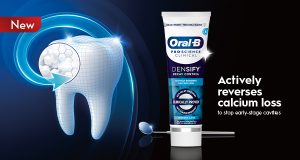The Benefits of a Healthy Smile – A healthy smile goes beyond just aesthetics; it has numerous benefits for both your physical and emotional well-being. Here are some of the key advantages of maintaining good oral health and having a healthy smile:
Improved Oral Health: Good oral hygiene practices, such as regular brushing, flossing, and dental check-ups, help prevent cavities, gum disease, and other oral issues. A healthy smile indicates that your teeth and gums are in good condition.

I have been using the new Oral-B Densify Decay Control toothpaste, professionally designed with clinically proven Stannous Complex Technology. This enhanced formula helps to actively reverse calcium loss to help prevent tooth decay and also to help stop early-stage cavities.
Oral-B Pro-Science Clinical toothpaste if used twice daily helps to reverse calcium loss by actively increasing enamel density in two critical areas: the enamel surface and along the gumline.
It is not just regular brushing, but teeth flossing and using mouthwash help remove plaque too, which is a sticky film of bacteria that forms on teeth. Plaque can produce acids that attack tooth enamel, leading to unsightly cavities and tooth decay.
Brushing and flossing also help remove plaque and prevent the buildup of tartar. Tartar, or hardened plaque, can irritate the gums and lead to gum disease (gingivitis and periodontitis). Gum disease can cause gum inflammation, bad breath, gum recession, and even tooth loss if left untreated.
Better Overall Health: You may not be aware, but oral health is connected to overall health. Poor oral hygiene has been linked to various systemic conditions, including cardiovascular disease, diabetes, respiratory infections, and pregnancy complications. By keeping your smile healthy, you contribute to your overall well-being.
Enhanced Digestion: Healthy teeth are essential for proper chewing, which is the first step in the digestion process. Chewing breaks down food into smaller particles, making it easier for your body to digest and absorb nutrients.
Boosted Self-Confidence: A healthy smile can significantly impact your self-esteem and self-confidence. When you feel good about your teeth and smile, you are more likely to engage socially and professionally with a positive attitude.
Improved Speech: Properly aligned teeth play a crucial role in articulating sounds and speaking clearly. Orthodontic treatments can help correct misalignments that may affect speech.
Long-lasting Teeth: Maintaining good oral hygiene can prevent tooth decay and gum disease, increasing the longevity of your natural teeth and reducing the need for extensive dental treatments.
Prevention of Bad Breath: Good oral hygiene helps eliminate bacteria and plaque, reducing the risk of bad breath (halitosis). Fresh breath can boost self-confidence and make individuals feel more comfortable in social situations. When you have fresh breath, you may feel more at ease when speaking to others, leading to improved self-assurance. It can also leave a positive impression on others. It shows that you take care of your oral health and personal hygiene, which can contribute to a favourable perception of you. This can be particularly important in professional settings, job interviews, or when meeting new people.
Less Pain and Discomfort: Oral health problems, such as cavities and gum disease, can cause pain and discomfort. By taking care of your teeth and gums, you can minimise the risk of dental pain and related issues.
Saving Money: Regular dental check-ups and preventive care can identify and address potential dental problems early on, saving you money in the long run by avoiding costly treatments for advanced oral issues.
Positive First Impressions: Your smile is often one of the first things people notice about you. A healthy, confident smile can leave a positive and lasting impression on others.
Improved Relationships: A healthy smile can make you appear more approachable and friendly, leading to better interpersonal relationships.
Remember, maintaining a healthy smile requires consistent oral hygiene practices, it is a lifelong commitment and an important part of maintaining a healthy smile and overall well-being. If you have any specific concerns or dental issues, it’s essential to consult with a dentist for personalised advice and treatment.
Poppy Watt


